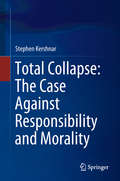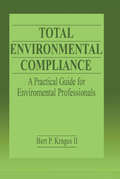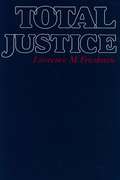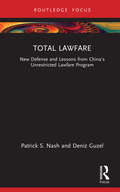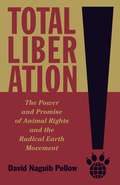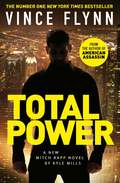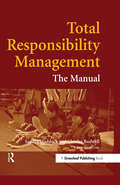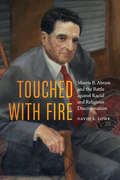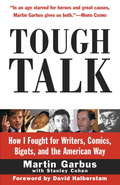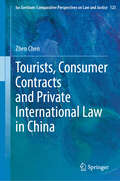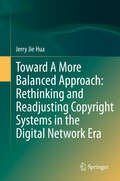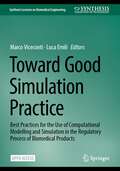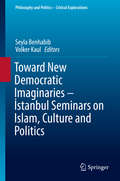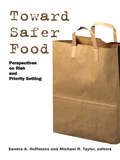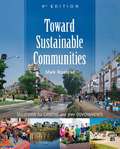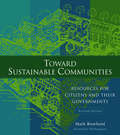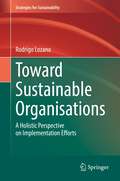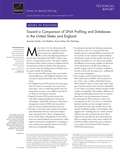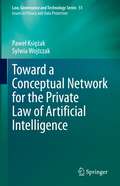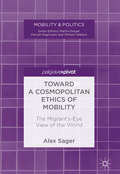- Table View
- List View
Total Collapse: The Case Against Responsibility and Morality
by Stephen KershnarThis book argues that there is no morality and that people are not morally responsible for what they do. In particular, it argues that what people do is neither right nor wrong and that they are neither praiseworthy nor blameworthy for doing it. Morality and moral responsibility lie at the heart of how we view the world. In our daily life, we feel that people act rightly or wrongly, make the world better or worse, and are virtuous or vicious. These policies are central to our justifying how we see the world and treat others. In this book, the author argues that our views on these matters are false. He presents a series of arguments that threaten to undermine our theoretical and practical worldviews. The philosophical costs of denying moral responsibility and morality are enormous. It does violence to philosophical positions that many people took a lifetime to develop. Worse, it does violence to our everyday view of people. A host of concepts that we rely on daily (praiseworthy, blameworthy, desert, virtue, right, wrong, good, bad, etc.) fail to refer to any property in the world and are thus deeply mistaken. This book is of interest to philosophers, lawyers, and humanities professors as well as people interested in morality, law, religion, and public policy.
Total Environmental Compliance: A Practical Guide for Environmental Professionals
by Bert P. Krages IITotal Environmental Compliance: A Practical Guide for Environmental Professionals gives you the background and skills you need to ensure total environmental compliance in your organization. Instead of dryly describing theoretical management systems or reciting regulatory provisions, the author delves into the challenging issues of why organizations
Total Justice
by Lawrence M. FriedmanIt is a widely held belief today that there are too many lawsuits, too many lawyers, too much law. As readers of this engaging and provocative essay will discover, the evidence for a "litigation explosion" is actually quite ambiguous. But the American legal profession has become extremely large, and it seems clear that the scope and reach of legal process have indeed increased greatly. How can we best understand these changes? Lawrence Friedman focuses on transformations in American legal culture—that is, people's beliefs and expectations with regard to law. In the early nineteenth century, people were accustomed to facing sudden disasters (disease, accidents, joblessness) without the protection of social and private insurance. The uncertainty of life and the unavailability of compensation for loss were mirrored in a culture of low legal expectations. Medical, technical, and social developments during our own century have created a very different set of expectations about life, again reflected in our legal culture. Friedman argues that we are moving toward a general expectation of total justice, of recompense for all injuries and losses that are not the victim's fault. And the expansion of legal rights and protections in turn creates fresh expectations, a cycle of demand and response. This timely and important book articulates clearly, and in nontechnical language, the recent changes that many have sensed in the American legal system but that few have discussed in so powerful and sensible a way. Total Justice is the third of five special volumes commissioned by the Russell Sage Foundation to mark its seventy-fifth anniversary.
Total Lawfare: New Defense and Lessons from China’s Unrestricted Lawfare Program
by Patrick S. Nash Deniz GuzelThis book advocates for a novel doctrine of ‘total lawfare’ as part of a comprehensive approach to modern hybrid warfare.The book begins by introducing the military concept of ‘limited lawfare’ in the context of modern geopolitical conditions. It proceeds to set out a conceptual history of lawfare in the West, highlighting conceptual shortcomings and NATO’s limited capabilities in this branch of hybrid warfare. It then provides a comparative case study and strategic threat assessment of the Chinese concept of ‘unrestricted lawfare’. Against this, the book grounds an ethical doctrine of ‘total lawfare’ within the Western jurisprudential tradition and translates this into practice as a key pillar of modern defense strategy under the rule of law. The book concludes by advocating for a Thielian ‘New Defense’ industry centered upon ‘total lawfare’ as a legitimate and effective Western response to enemy aggression.The book will be of interest to academics, policy-makers, and students working in the fields of lawfare, jurisprudence, and military law.
Total Liberation: The Power and Promise of Animal Rights and the Radical Earth Movement
by David Naguib PellowWhen in 2001 Earth Liberation Front activists drove metal spikes into hundreds of trees in Gifford Pinchot National Forest, they were protesting the sale of a section of the old-growth forest to a timber company. But ELF&’s communiqué on the action went beyond the radical group&’s customary brief. Drawing connections between the harms facing the myriad animals who make their home in the trees and the struggles for social justice among ordinary human beings resisting exclusion and marginalization, the dispatch declared, &“all oppression is linked, just as we are all linked,&” and decried the &“patriarchal nightmare&” in the form of &“techno-industrial global capitalism.&” In Total Liberation, David Naguib Pellow takes up this claim and makes sense of the often tense and violent relationships among humans, ecosystems, and nonhuman animal species, expanding our understanding of inequality and activists&’ uncompromising efforts to oppose it. Grounded in interviews with more than one hundred activists, on-the-spot fieldwork, and analyses of thousands of pages of documents, websites, journals, and zines, Total Liberation reveals the ways in which radical environmental and animal rights movements challenge inequity through a vision they call &“total liberation.&” In its encounters with such infamous activists as scott crow, Tre Arrow, Lauren Regan, Rod Coronado, and Gina Lynn, the book offers a close-up, insider&’s view of one of the most important—and feared—social movements of our day. At the same time, it shows how and why the U.S. justice system plays to that fear, applying to these movements measures generally reserved for &“jihadists&”—with disturbing implications for civil liberties and constitutional freedom. How do the adherents of &“total liberation&” fight oppression and seek justice for humans, nonhumans, and ecosystems alike? And how is this pursuit shaped by the politics of anarchism and anticapitalism? In his answers, Pellow provides crucial in-depth insight into the origins and social significance of the earth and animal liberation movements and their increasingly common and compelling critique of inequality as a threat to life and a dream of a future characterized by social and ecological justice for all.
Total Petroleum Hydrocarbons: Environmental Fate, Toxicity, and Remediation
by Naga Raju Maddela Kadiyala Venkateswarlu Saranya Kuppusamy Mallavarapu MegharajThe term “total petroleum hydrocarbons” (TPHs) is used for any mixture of several hundred hydrocarbons found in crude oil, and they represent the sum of volatile petroleum hydrocarbons and extractable petroleum hydrocarbons. The petrol-range organics include hydrocarbons from C6 to C10, while diesel-range organics are C10-C28 hydrocarbons. Environmental pollution by petroleum hydrocarbons is one of the major global concerns, particularly in oil-yielding countries. In fact, there are more than five million potentially contaminated areas worldwide that represent, in general, a lost economic opportunity and a threat to the health and well-being of humans and the environment. Petroleum-contaminated sites constitute almost one-third of the total sites polluted with chemicals around the globe. The land contamination caused by industrialization was recognized as early as the 1960s, but less than a tenth of potentially contaminated lands have been remediated due to the nature of the contamination, cost, technical impracticability, and insufficient land legislation and enforcement. This book is the first single source that provides comprehensive information on the different aspects of TPHs, such as sources and range of products, methods of analysis, fate and bioavailability, ecological implications including impact on human health, potential approaches for bioremediation such as risk-based remediation, and regulatory assessment procedures for TPH-contaminated sites. As such, it is a valuable resource for researchers, graduate students, technicians in the oil industry and remediation practitioners, as well as policy makers.
Total Power (The Mitch Rapp Series #19)
by Kyle Mills Vince FlynnWhen terrorists take out the entire US power grid, it's a race against the clock to prevent chaos in this compulsive thriller, part of the New York Times bestselling Mitch Rapp series.&‘Suspenseful, strikingly original&’ Publishers Weekly&‘Proves once again that the Mitch Rapp series is &“the best in the world when it comes to special ops&”&’ Booklist Captured by Mitch Rapp, ISIS&’s top technology expert reveals that he was about to meet a man who could bring down America&’s power grid. When the CIA trap to eliminate this man fails, ISIS operatives help the cyber terrorist do what he said he would – plunge the country into darkness. With no concept of how this unprecedented act was accomplished, the task of getting the power back on could take months, or even years. Computers and phone networks are down, petrol pumps are inoperable, even water systems and food supplies are struggling. With resources suddenly gone and America on the brink of collapse, Rapp and his team embark on a mission to find the only people who can repair the damage – the ones who caused it. But this is unlike anything he&’s experienced before and time is running out . . .Can Rapp get the lights back on before it's too late?Praise for the Mitch Rapp series 'Sizzles with inside information and CIA secrets' Dan Brown 'A cracking, uncompromising yarn that literally takes no prisoners' The Times 'Vince Flynn clearly has one eye on Lee Child's action thriller throne with this twist-laden story. . . instantly gripping' Shortlist 'Action-packed, in-your-face, adrenalin-pumped super-hero macho escapist fiction that does exactly what it says on the label' Irish Independent 'Mitch Rapp is a great character who always leaves the bad guys either very sorry for themselves or very dead' Guardian 'Outstanding . . . Mills is writing at the top of his game' Publishers Weekly
Total Responsibility Management: The Manual
by Sandra Waddock Charles BodwellAlmost every manager today knows that satisfying customers by meeting their quality demands is a critical component of business success. Quality management is a given in modern companies – a competitive imperative. Yet it was not always so. Back when the quality movement was getting started, few managers really understood either the importance of quality to customers or how to manage for quality. Much the same could be said today about managing responsibility. Why and how should responsibility be managed? What is responsibility management? Total Responsibility Management answers these questions while at the same time providing a systemic framework for managing a company's responsibilities to stakeholders and the natural environment that can be applied in a wide range of contexts. This framework uses managerial familiarity with quality management to illustrate the drivers for responsibility management. Companies know that product or service quality affects their customer relationships and the trust customers have in the company's products and services. So, too, a company's management of its responsibilities to other constituencies affects its relationships with those other stakeholders and the natural environment. But why bother? The answer is quite simple. Never has it been easier for employees, reporters, activists, investors, community members, the media and other critical observers to find fault with companies and their subsidiaries. A problem identified, even in a remote region or within a remote supplier, can instantaneously be transmitted around the world at the click of a mouse. Ask footwear, toy, clothing and other highly visible branded companies what their recent experience with corporate critics has been and they will tell you about the need to manage their stakeholder responsibilities (human rights, labour relations, environmental, integrity-related) or face significant consequences in the limelight of public opinion. Managers will discover that whether they do it consciously or not, they are already managing responsibility, just as companies were already managing quality when the quality movement hit. This manual makes the process of managing responsibilities to and relationships with stakeholders and nature explicit. Making the process explicit is important because too few of today's decisions-makers yet understand how they are managing stakeholder responsibilities as well as they understand how to manage quality. Managing responsibilities goes well beyond traditional 'do good' or discretionary activities associated with philanthropy and volunteerism, which are frequently termed 'corporate social responsibility'. In its broadest sense, responsibility management means taking corporate citizenship seriously as a core part of the way the company develops and implements its business model. The specifics of responsibility management are unique to each company, its industry, its products and its stakeholders, yet, as this manual illustrates, a general approach to managing responsibility is feasible – indeed, is increasingly necessary. Based on work undertaken by Boston College and the International Labour Office, Total Responsibility Management is the first CSR manual. Its original case studies add value to a range of tools and exercises that will make it required reading for all managers in need of a practical guide to managing responsibility and to students and researchers looking for an overarching framework to contextualise the changing responsibilities of global business.
Touched with Fire: Morris B. Abram and the Battle against Racial and Religious Discrimination
by David E. LoweMorris B. Abram (1918–2000) emerged from humble origins in a rural South Georgia town to become one of the leading civil rights lawyers in the United States during the 1950s. While unmasking the Ku Klux Klan and serving as a key intermediary for the release of the Rev. Martin Luther King Jr. from prison on the eve of the 1960 presidential election, Abram carried out a successful fourteen-year battle to end the discriminatory voting system in his home state, which had entrenched racial segregation. The result was the historic &“one man, one vote&” ruling of the U.S. Supreme Court in 1963. At the time of his selection—the youngest person ever chosen to head the American Jewish Committee—Abram became a leading international advocate for the Jewish state of Israel. He was also a champion of international human rights, from his leadership in the struggle to liberate Soviet Jewry to his service as permanent representative to the United Nations in Geneva. In Touched with Fire David E. Lowe chronicles the professional and personal life of this larger-than-life man. Encompassing many of the contentious issues we still face today—such as legislative apportionment, affirmative action, campus unrest, and the enforcement of international human rights— Abram&’s varied career sheds light on our own troubled times. Abram was tapped for service by five different U.S. presidents and survived a battle with acute myelocytic leukemia. He never abandoned his belief that the United States might someday become a colorblind society, where people would be judged, as his friend Martin Luther King dreamed, not by the color of their skin but by the content of their character. This elegantly written book is the biography Abram has long deserved.
Toufah: The Woman Who Inspired an African #MeToo Movement (Eyewitness Memoirs)
by Toufah Jallow Kim Pittaway*One of The Most Anticipated Books of Fall 2021 (Kirkus Reviews, Publishers Weekly)* "This powerful story shouldn&’t be missed." —Publishers Weekly (starred review) An incandescent and inspiring memoir of resilience from a courageous young woman whose powerful advocacy brings to mind the presence, resolve, and moral authority of Amanda Gorman and Greta ThunbergBefore launching an unprecedented protest movement, Toufah Jallow was just a 19-year-old dreaming of a scholarship. Encouraged by her mother to pursue her own ambitions, Toufah entered a presidential competition purportedly designed to identify the country's smart young women and support their educational and career goals. Toufah won. Yahya Jammeh, the dictator who had ruled The Gambia all of Toufah's life, styled himself as a pious yet progressive protector of women. At first he behaved in a fatherly fashion toward Toufah, but then proposed marriage, and she turned him down. On a pretext, his female cousin then lured Toufah to the palace, where he drugged and raped her. Toufah could not tell anyone. There was literally no word for rape in her native language. If she told her parents, they would take action, and incur Jammeh's wrath. Wearing a niqab to hide her identity, she gave Jammeh&’s security operatives the slip and fled to Senegal. Her eventual route to safety in Canada is full of close calls and intrigue. 18 months after Jammeh was deposed, Toufah Jallow became the first woman in The Gambia to make a public accusation of rape against him, sparking marches of support and a social media outpouring of shared stories among West African women under #IAmToufah. Each brave and bold decision she made set Toufah on the path to reclaim the personal growth and education that Jammeh had tried to steal from her, a future also of leadership and advocacy for survivors of sexual violence, especially in heavily patriarchal countries lacking resources and laws to protect women and even the language with which to speak openly about sexual threats and violence.
Tough Talk: How I Fought for Writers, Comics, Bigots, and the American Way
by Martin Garbus Stanley CohenThe boisterous freedom promised by the First Amendment is both the heart of American experiment and the fissure along which it divides itself. Those who would fight freedom's enemies, from political correctness to corporate intimidation to outright censorship, face powerful adversaries. But they also have a potent weapon at their disposal: good, old-fashioned talk--tough talk. And as one of America's leading First Amendment attorneys, Martin Garbus is one of the toughest talkers there is. Starting with his work on the tam that defended the legendary satirist Lenny Bruce against obscenity charges, Garbus has been a fearless advocate for some of the most important voices of our time, among them union organizer Cesar Chavez, actor Robert Redford, director Spike Lee, writer Samuel Beckett, Russian dissident Andrei Sakharov, and Czech playwright Vaclav Havel, who, as president of his country's revolutionary government, invited Garbus to help write the nation's constitution. But Garbus is not an ivory-tower theoretician. He is a highly effective defense lawyer who takes on cases with the full intent of winning. In Tough Talk, Garbus goes behind the scenes to show us how our system really works and what he does to make it work for his clients. How does an attorney get controversial cases? What does he do to gain control of a hostile courtroom? How does he work with a defendant whose beliefs are the opposite of his own? Tough Talk is both the story of one man's battle for freedom and a clear-eyed account of every major First Amendment issue this nation has faced in the last three decades, for the battles Garbus has fought have become the touchstones of America's debate about the limits of freedom. In showing us how he has harnessed his personal idealism to the gritty reality of the courtroom, Garbus gives brilliant testimony to the power of tough talk.
Tourism and Culture in Philosophical Perspective
by John Dillon Marie-Élise ZovkoThis book offers a philosophical approach to tourism as a permanent factor in the lifestyle, economy, and culture of the contemporary global community. Travel to well-known destinations and pursuit of an ever-increasing range of leisure activities are an aspiration of most humans today. Those not themselves engaged in tourist activities are quite often involved in providing the goods and services which make tourism possible. Yet the ill effects of mass tourism and overtourism on sensitive ecosystems, resources, and community life have begun to outweigh economic gains, threatening to destroy destinations, cultural heritage, and livelihoods. The editors and contributors of this collection reflect on the nature and meaning of tourism, its history, elements, and forms, the roles of tourist and host, the limits of hospitality, tendencies to excess and the reasons why we engage in such forms of behaviour, and the place of tourism in human culture as a whole. By shedding light on these questions, more efficacious solutions to the urgent problems raised by the practice of tourism can be found. This work is a must-read for scholars, teachers, and students engaged in study and research on philosophy of culture, philosophical anthropology, tourist and destination management, human factors engineering, and sustainability.
Tourism, Heritage and Commodification of Non-human Animals: A Posthumanist Reflection
by Alejandro Morales Carolin Funck Gustavo Ortiz-Millán Johan Edelheim Bobbie Chew Bigby Tomas Arias Jean Azcatl Pineda Alicia Mariana Pérez Émilie Crossley Georgina Flores Leonardo Garavito-González Yulei Guo Dr Jes Hooper Brenda Martínez Velasco Mateo Nicolás Medina Jorge Iván Barrera Javed Salim Estephania Sepúlveda Perdomo Rie Usui David A. Varela-Trejo Nusrat YasmeenHeritage is a social construction rooted in modern and contemporary societies. It is commonly a positive assessment of many elements of the physical and human environment (e.g. ecosystems and landscapes, monuments, customs, gender norms, religious practices, gastronomy, and livelihoods). Heritage and tourism are strongly related to each other in that heritage gives rise to tourist attractions and activities, and tourism enhances the designation of heritage sites. Non-human animals (hereafter 'animals') are present as implicit or explicit heritage elements through multiple tourist environments: animals may be themselves the heritage focus of tourist interest (visual arts, gastronomy, as charismatic and distinguished beings, as part of festivities or rituals), or it may be that animals are agents involved in heritage tourist environments such as working animals or in recreational activities. A post-humanist perspective the moral valuation of equality between humans and other animals demands that both are sentient beings and self-aware of their pain and pleasure. Thus, the involvement of animals as heritage elements by themselves or as an element of tourist consumption in heritage sites implies their commodification and lack of agency. As such, these practices are usually unethical, since they threaten the animals' primary interests: not to suffer, not to feel pain and to be able to live their freedom. This book contains chapters that reveal both the unethical interactions between humans and animals within heritage tourism, and those that show experiences in which efforts are made to minimize damage within the commercialization of animals involved as heritage themselves. It will be of interest to postgraduate students, academics, NGOs and tourism planners.
Tourists, Consumer Contracts and Private International Law in China (Ius Gentium: Comparative Perspectives on Law and Justice #123)
by Zhen ChenThis book explores the intersection of consumer contracts and private international law, with a specific focus on tourists in China. The primary aim is to analyze how private international law addresses consumer protection issues, particularly for tourists, and to come up with legislative proposals to improve consumer protection in China. By examining current legislative provisions, case studies, and judicial practices, the book provides a comprehensive understanding of consumer protection in Chinese private international law and potential legal reforms to enhance consumers&’ access to justice in cross-border litigation. The increasing globalization and mobility of consumers, especially tourists, call for robust legal frameworks to protect their rights across borders. While China does endeavor to protect consumers, the current regulations in Chinese private international law remain insufficient. Consumers, including tourist consumers, still encounter major obstacles in international civil litigation. This book highlights the strengths and weaknesses of China&’s legal system, offering insights for potential legal reforms to enhance consumer protection there. This book is intended for academics, legal practitioners, policymakers, and students with an interest in private international law, consumer protection, and comparative law. It also offers a valuable resource for international organizations involved in consumer rights and tourism. By providing a focused analysis of tourist-related consumer contracts in China, it fills a critical gap in the existing literature.
Toward A More Balanced Approach: Rethinking and Readjusting Copyright Systems in the Digital Network Era
by Jerry Jie HuaBased on comparative research concerning both international conventions and laws, regulations, policies and cases from different jurisdictions, this book puts forward proposals for recovering the balance of interests between copyright holders, technological intermediaries and public users with regard to the access to, distribution and exploitation of copyright works. Four specific issues are discussed in detail: · an anti-circumvention rule for protection of technological measures that control access to copyright material; · indirect infringing liability for internet service providers and safe harbor regulations, which influence the dissemination of copyright works; · copyright limitations and exceptions especially under the digital network environment, which are relevant to the extent that users are allowed to exploit copyright works; · digital commons projects that promote the distribution and adaptation of copyright works placed under voluntary license schemes, which are relevant to the tolerance and encouragement of remix culture.
Toward Good Simulation Practice: Best Practices for the Use of Computational Modelling and Simulation in the Regulatory Process of Biomedical Products (Synthesis Lectures on Biomedical Engineering)
by Marco Viceconti Luca EmiliThis open access book, the Community of Practice led by the VPH Institute, the Avicenna Alliance, and the In Silico World consortium has brought together 138 experts in In Silico Trials working in academia, the medical industry, regulatory bodies, hospitals, and consulting firms. Through a consensus process, these experts produced the first attempt to define some Good Simulation Practices on how to develop, evaluate, and use In Silico Trials. Good Simulation Practice constitutes an indispensable guide for anyone who is planning to engage at any title with In Silico Trials.
Toward New Democratic Imaginaries - İstanbul Seminars on Islam, Culture and Politics
by Seyla Benhabib Volker KaulThis volume combines rigorous empirical and theoretical analyses with political engagement to look beyond reductive short-hands that ignore the historical evolution and varieties of Islamic doctrine and that deny the complexities of Muslim societies' encounters with modernity itself. Are Islam and democracy compatible? Can we shed the language of 'Islam vs. the West' for new political imaginaries?The authors analyze struggles over political legitimacy since the Arab Spring and the rise of Al Qaeda and ISIS in their historical and political complexity across the MENA (Middle East and North Africa) region. Distinguishing multiculturalism from interculturalism and understanding multiple modernities, philosophers in the volume tease out the complexities of civilizational encounters. The volume also shows how the Paris massacres or the Danish caricature controversy do not remain confined to Europe but influence struggles and confrontations within Muslim societies. Gender and Islam are addressed from a comparative perspective bringing into conversation not only the experience of different Muslim countries with Islamic law but also by analysing Jewish family law.
Toward Safer Food: Perspectives on Risk and Priority Setting
by Sandra Professor Hoffmann Michael R. TaylorIn 1998, a National Academy of Sciences panel called for an integrated, risk-based food safety system. This goal is widely embraced, but there has been little advance in thinking about how to integrate knowledge about food safety risks into a system- wide risk analysis framework. Such a framework is the essential scientific basis for better priority setting and resource allocation to improve food safety. Sandra Hoffmann and Michael Taylor bring together leading scientists, risk analysts, and economists, as well as experienced regulators and policy analysts, to better define the priority setting problem and focus on the scientific and intellectual resources available to construct a risk analysis framework for improving food safety. Toward Safer Food provides a common starting point for discussions about how to construct this framework. The book includes a multi-disciplinary introduction to the existing data, research, and methodological and conceptual approaches on which a system-wide risk analysis framework must draw. It also recognizes that efforts to improve food safety will be influenced by the current institutional context, and provides an overview of the ways in which food safety law and administration affect priority setting. Hoffman and Taylor intend their book to be accessible to people from a wide variety of backgrounds. At the same time, they retain the core conceptual sophistication needed to understand the challenges that are inherent in improving food safety. The editors hope that this book will help the U.S. move beyond a call for an integrated, risk-based system toward its actual construction.
Toward Scientific Medicine
by O. S. MiettinenScientific medicine in Miettinen's conception of it is very different from the two ideas about it that come to eminence in the 20th century. To him, medicine is scientific to the extent that it has a rational theoretical framework and a knowledge-base from medical science. He delineates the nature of that theoretical framework and of the research to develop the requisite knowledge for application in such a framework. The knowledge ultimately needed is about diagnostic, etiognostic, and prognostic probabilities, and it necessarily is to be codified in the form of probability functions, embedded in practice-guiding expert systems. In these terms, today's medicine still is mostly pre-scientific, and major innovations are needed within and around medicine for healthcare to get to be in tune with reasonable expectations about it in this Information Age. Thus, while the leading cause of litigation for medical malpractice in the U. S. is failure to expeditiously and correctly diagnose the probability of myocardial infarction in a hospital's emergency room, this book shows that a typical modern textbook of cardiology, just as one of medicine at large, imparts no knowledge about the diagnostic probabilities needed in this, and that the prevailing type of diagnostic research will not produce the requisite knowledge. If the diagnostic pursuits in an ER would be guided by an emergency-room diagnostic expert system, this would guarantee expert diagnoses by all ER doctors. Academic leaders of medicine and medical researchers concerned to advance the knowledge-base of medicine will find a wealth of stimulus for thinking about the deficiencies of the prevailing knowledge culture in and surrounding medicine, and about the directions of the needed progress toward genuinely scientific medicine.
Toward Sustainable Communities
by Mark RoselandThe need to make our communities sustainable is more urgent than ever before. Toward Sustainable Communities remains the single most useful resource for creating vibrant, healthy, equitable, economically viable places. This comprehensive update of the classic text presents a leading-edge overview of sustainability in a new fully illustrated, full-color format.Compelling new case studies and expanded treatment of sustainability in rural as well as urban settings are complemented by contributions from a range of experts around the world, demonstrating how "community capital" can be leveraged to meet the needs of cities and towns for:*Energy efficiency, waste reduction, and recycling*Water, sewage, transportation, and housing*Climate change and air quality*Land use and urban planning.Fully supported by a complete suite of online resources and tools, Toward Sustainable Communities is packed with concrete, innovative solutions to a host of municipal challenges. Required reading for policymakers, educators, social enterprises, and engaged citizens, this "living book" will appeal to anyone concerned about community sustainability and a livable future.Mark Roseland is director of the Centre for Sustainable Community Development at Simon Fraser University and professor at SFU's School of Resource and Environmental Management. He lectures internationally, advises communities and governments on sustainable development policy and planning, and has been cited as one of British Columbia's "top fifty living public intellectuals."
Toward Sustainable Communities
by Stacy Mitchell Mark RoselandLocal governments are increasingly caught between rising expectations that development initiatives be sustainable and the fact that more and more services are being downloaded to the municipal level. The third edition of this classic text offers practical suggestions and innovative solutions to a range of community problems---including energy efficiency, transportation, land use, housing, waste reduction, recycling, air quality and governance. In clear language, with updated tools, initiatives and resources, a new preface and foreword, this sustainable practices resource is for both citizens and governments.Mark Roseland is director of the Centre for Sustainable Community Development at Simon Fraser University in British Columbia. He lectures internationally and advises communities and governments.
Toward Sustainable Organisations: A Holistic Perspective on Implementation Efforts (Strategies for Sustainability)
by Rodrigo LozanoThe book is one of the first ones focussing on how organisations (civil society, corporations, and public sector ones) are contributing to sustainability. The book starts by providing a discussion of the four dimensions of sustainability (economic, environmental, social, and time). The second chapter focusses on what organisations are, their system elements (e.g. operations and production, management and strategy, and governance), stakeholders, relationships within and between organisations (ranging from competition to collaboration), and a framework for organisations to understand and map how they can contribute to sustainability. The third chapter discusses the twenty-four main tools, initiatives, and approaches (TIAs) that have been developed for organisations to contribute to sustainability, such as Circular Economy, Corporate Social Responsibility, Environmental Management Systems, and Sustainability Reporting. The fourth chapter focusses on organisational change management for sustainability, including types of change, drivers for change, resistance to change, incorporation, and institutionalisation. The fifth chapter presents empirical evidence on what civil society organisations have contributed to sustainability, from priorities and impacts, TIAs, external stimuli, and internal factors, drivers for change, starts of change, and development of change. The sixth chapter presents empirical evidence on what corporations have contributed to sustainability, from priorities and impacts, TIAs, external stimuli, and internal factors, drivers for change, starts of change, and development of change. The seventh chapter presents empirical evidence on what public sector organisations have contributed to sustainability, from priorities and impacts, TIAs, external stimuli, and internal factors, drivers for change, starts of change, and development of change. The last chapter provides the conclusions of the book.The book is aimed at providing a multi-level, dynamic, and holistic perspective on the contributions of organisations to sustainability. The book's uniqueness lies in analysing organisations’ efforts to become more sustainability oriented and contribute to making societies more sustainable through systems thinking, TIAs, and change processes.
Toward a Comparison of DNA Profiling and Databases in the United States and England
by Carl Matthies Paul Steinberg Emma Disley Jeremiah GoulkaRAND researchers explored the U.S. and English forensic DNA analysis systems to find out whether England has capitalized more fully on their crime-fighting potential than the U.S. system, processing samples more quickly and providing more database hits for law enforcement.
Toward a Conceptual Network for the Private Law of Artificial Intelligence (Law, Governance and Technology Series #51)
by Paweł Księżak Sylwia WojtczakThis book provides a set of proposals for the new conceptual network required in order to establish civil law rules for a world permeated by Artificial Intelligence. These proposals are intended by their authors to push the debate on the new civil law forward. In spite of the natural conservatism of jurists, some innovative or even futuristic ideas are called for, also because the future, even this not-so-distant one, is difficult to foresee. Paradoxically, and unlike in the past, this lack of knowledge must not stop us from planning. If it does, humankind may, as some pessimists already claim, lose its chance to win the battle for control of the world.The rise and expansion of Artificial Intelligence and robotics in recent years has highlighted a pressing need to create a suitable legal framework for this new phenomenon. The debate on the subject, although wide-ranging and involving many new legal documents, is still quite general and preliminary in nature, although these preparatory works illustrate the very real need to develop appropriate new civil law arrangements. It is exactly the branch of private law where the necessity of these new rules appears to be the most imperative. Autonomous vehicles, medical robots, and expertise software raise fundamental questions on aspects of civil liability such as culpability; whereas the growth in popularity of automated, intelligent software systems for concluding contracts requires a new approach to many fundamental and deeply rooted elements of contract law, e.g. consciousness, intent, error, deception, interpretation of contracts and good faith. Ruling on these specific matters demands the identification and clarification of certain key points, which shall become the foundation for constructing AI/robot civil law.
Toward a Cosmopolitan Ethics of Mobility: The Migrant's-Eye View of the World (Mobility & Politics)
by Alex SagerThis book proposes a cosmopolitan ethics that calls for analyzing how economic and political structures limit opportunities for different groups, distinguished by gender, race, and class. The author explores the implications of criticisms from the social sciences of Eurocentrism and of methodological nationalism for normative theories of mobility. These criticisms lend support to a cosmopolitan social science that rejects a principled distinction between international mobility and mobility within states and cities. This work has interdisciplinary appeal, integrating the social sciences, political philosophy, and political theory.
